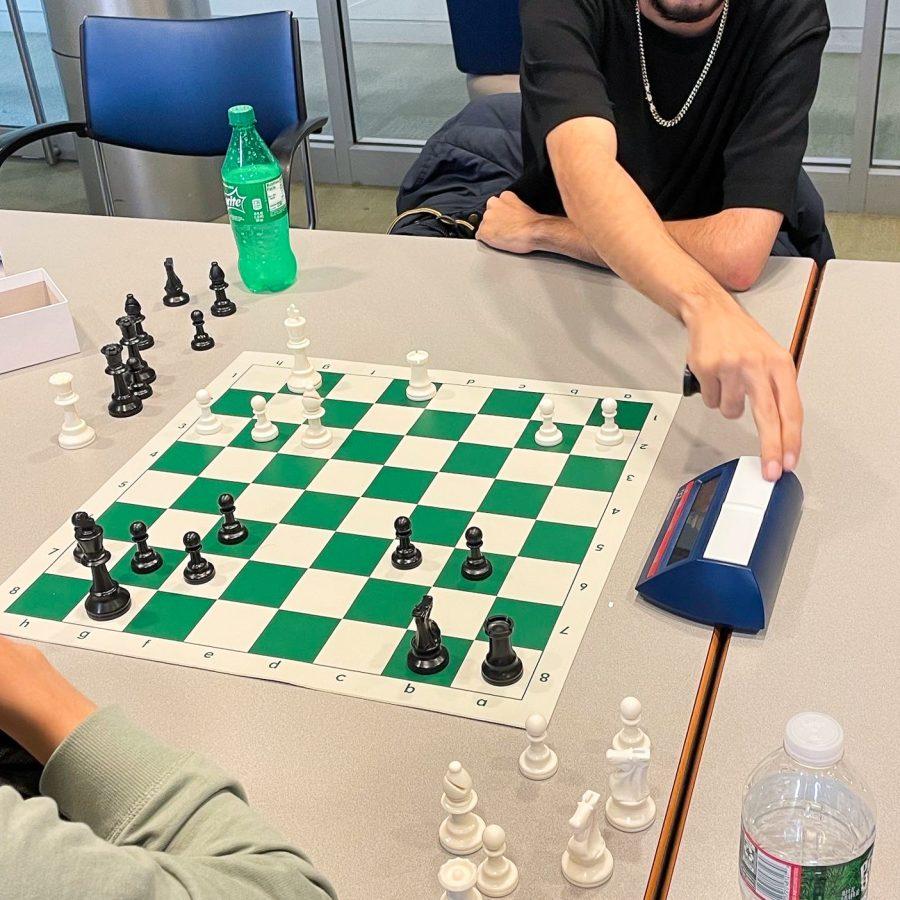According to UMass Boston Chess Club’s Secretary and Community Chair, Paul Castanino-Daly and Derek Belpedio, there is often a stigma surrounding chess that people have to be incredibly smart in order to play the game. However, the two members assure students that this is not the case.
“Its reputation is a lot more intimidating than what it actually is,” said Belpedio.
For those who don’t know, chess is a board game containing 32 pieces, with 16 per side. Two players alternately take turns moving their pieces in hopes to checkmate their opponent’s King and win the game. Checkmating the King consists of attacking it in a position where the opposing player can’t move their King out of the way, block the attack or remove the attacking piece.
“It’s like a sport. Once you learn the rules, it’s easy to understand,” said Castanino-Daly.
The Chess Club was reactivated in the fall semester of 2021, after being dormant for a number of years. Belpedio and two other students, including former president Nigel Liew, realized they were all trying to restart the club at the same time. After joining forces, the three were able to establish the club under a common goal: Making chess accessible to all. Liew, especially, wanted to appeal to students who “never tried playing out of fear that they weren’t ‘smart enough’ for the game.”
It seems they have achieved their goal, as the club now has nearly 150 members on its discord—many of them learning to play the game through the club. Their Social Media Manager, Monica Ferreira, had never played chess before joining, and Belpedio now describes her as a strong player.
The club has grown in other ways as well, including the introduction of different variants of chess at meetings. One of these variants is called “wheel chess,” where players spin a wheel and make the move the wheel lands on. Other variants include randomizing the piece order, where players change the starting order of the pieces’ usual fixed positions, and timed games, where players are forced to make moves quickly. Belpedio is more fond of fast chess like this, as “there’s less room for calculation and more room for really funny and wacky games.”
They also held a chess tournament last year, where the members were divided into upper and level brackets by skill. It lasted over two months, in order to accommodate everyone’s schedules, and one of the brackets ended in four games of tie-breaking rounds. The club has plans for more tournaments like this in the future.
For some, chess means a lot. One club member, who would like to stay anonymous, learned to play chess from their mom. Through chess, they’ve learned to take losses with dignity and reflect on failure in order to do better in the next game. They also appreciate the simple brilliance of chess.
“It’s beautiful because you can see how the human mind works. You can see how a person thinks,” they said.
Liew has also taken lessons from chess. It’s taught him to not repeat past mistakes and use “analytical thought processes to win games and improve.” He believes these “are essential skills in all areas of life to keep moving forward.”
For others, like Belpedio and Castanino-Daly, chess primarily functions as a competitive and stimulating game, as well as a social event. Club meetings don’t just involve chess, they’re an opportunity for students to mingle and meet new people. Belpedio’s favorite part of the club is the inclusivity.
“It’s cool to see so many different types of people at all skill levels all come together just to play chess,” he said.
The Chess Club is welcoming to all students, and there is absolutely no prior experience needed to join. Experienced members are willing to teach newcomers to play, and members like Castanino-Daly enjoy teaching chess—he sometimes spends more time teaching the game than playing in his own matches. Furthermore, there’s a large number of players with varied experiences, so there’s usually equally-skilled opponents for everyone who joins.
Online resources are also available for new chess players. Belpedio recommends a website called lichess.org, which is an open-source website that offers free lessons and online matches.
The Chess Club meets every Friday, on the third floor of Wheatley Hall in room 154-028 from 3-5 p.m. They also welcome spectators to come socialize and watch the matches unfold. To get in contact with the club, students can scan the club’s QR code, which will lead to their google form and discord link; email the current president—[email protected]—or reach out to their instagram @umassbostonchess.

